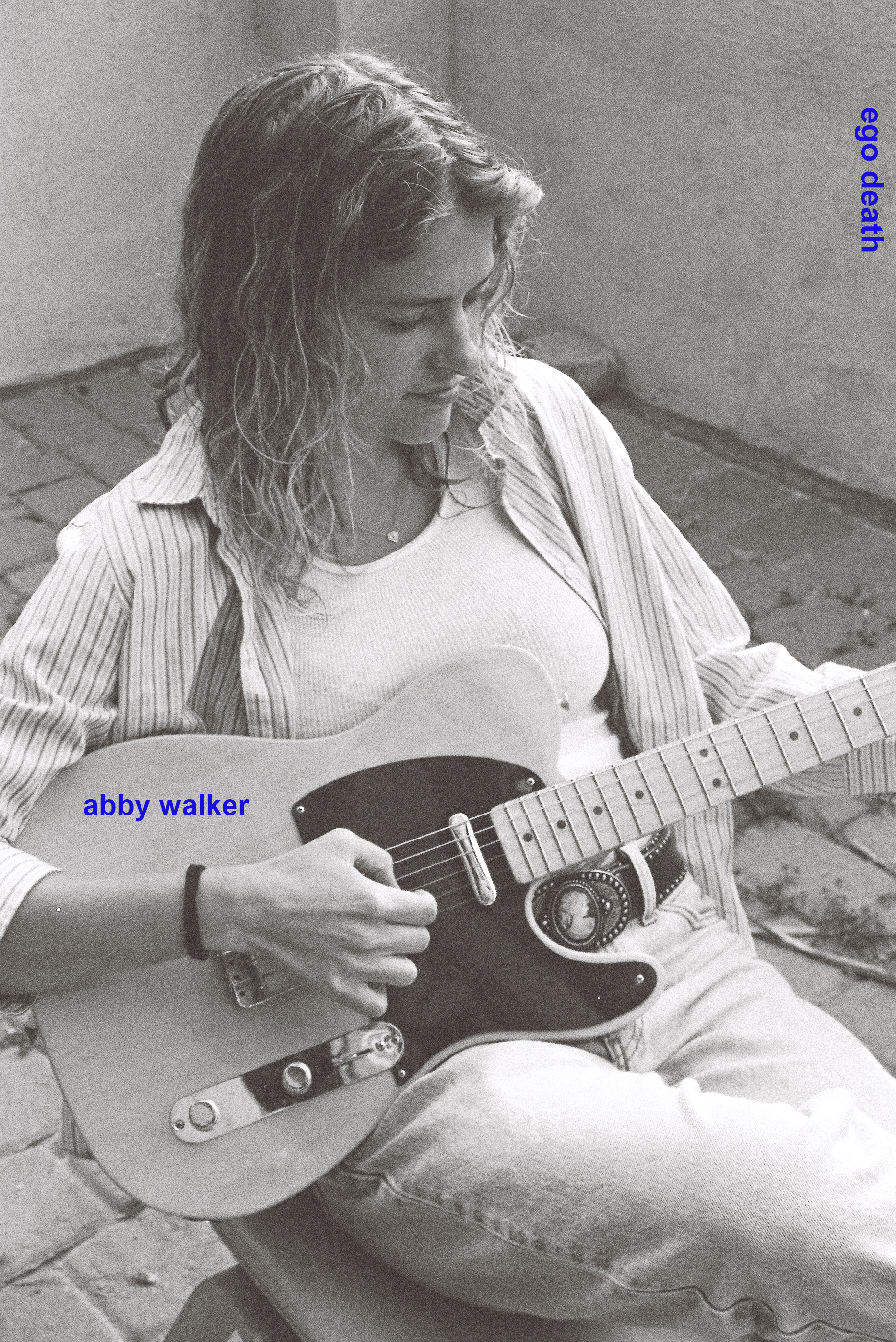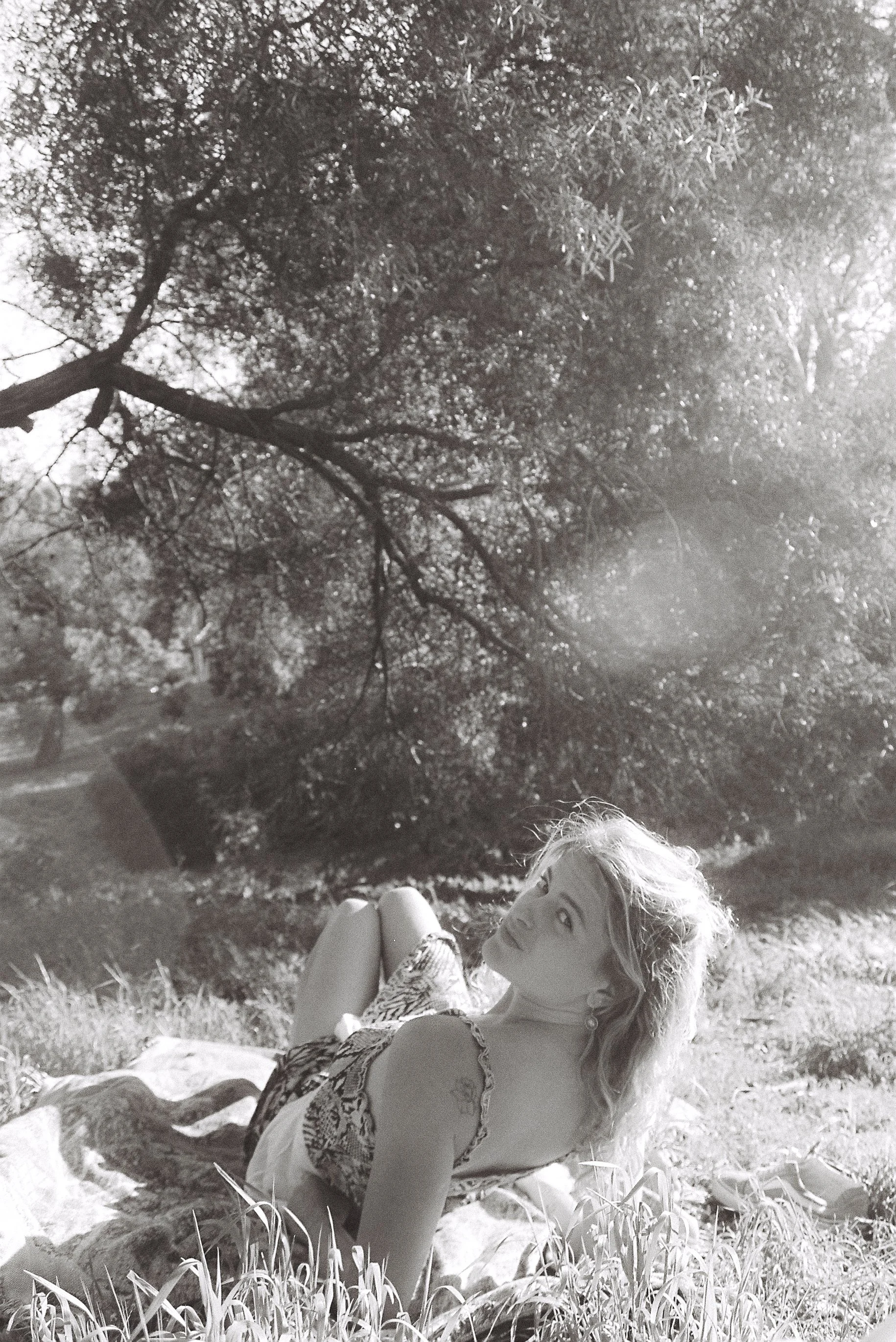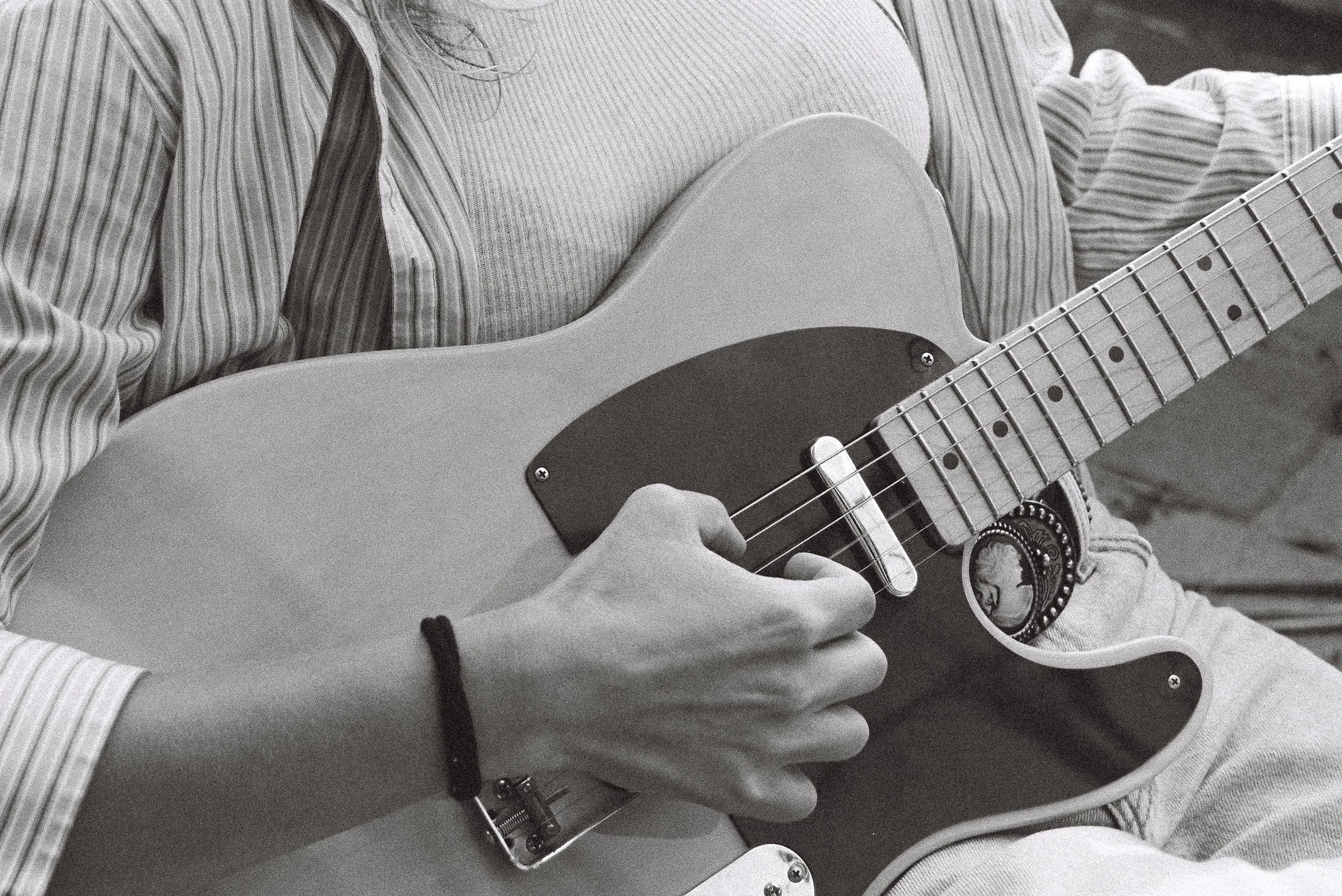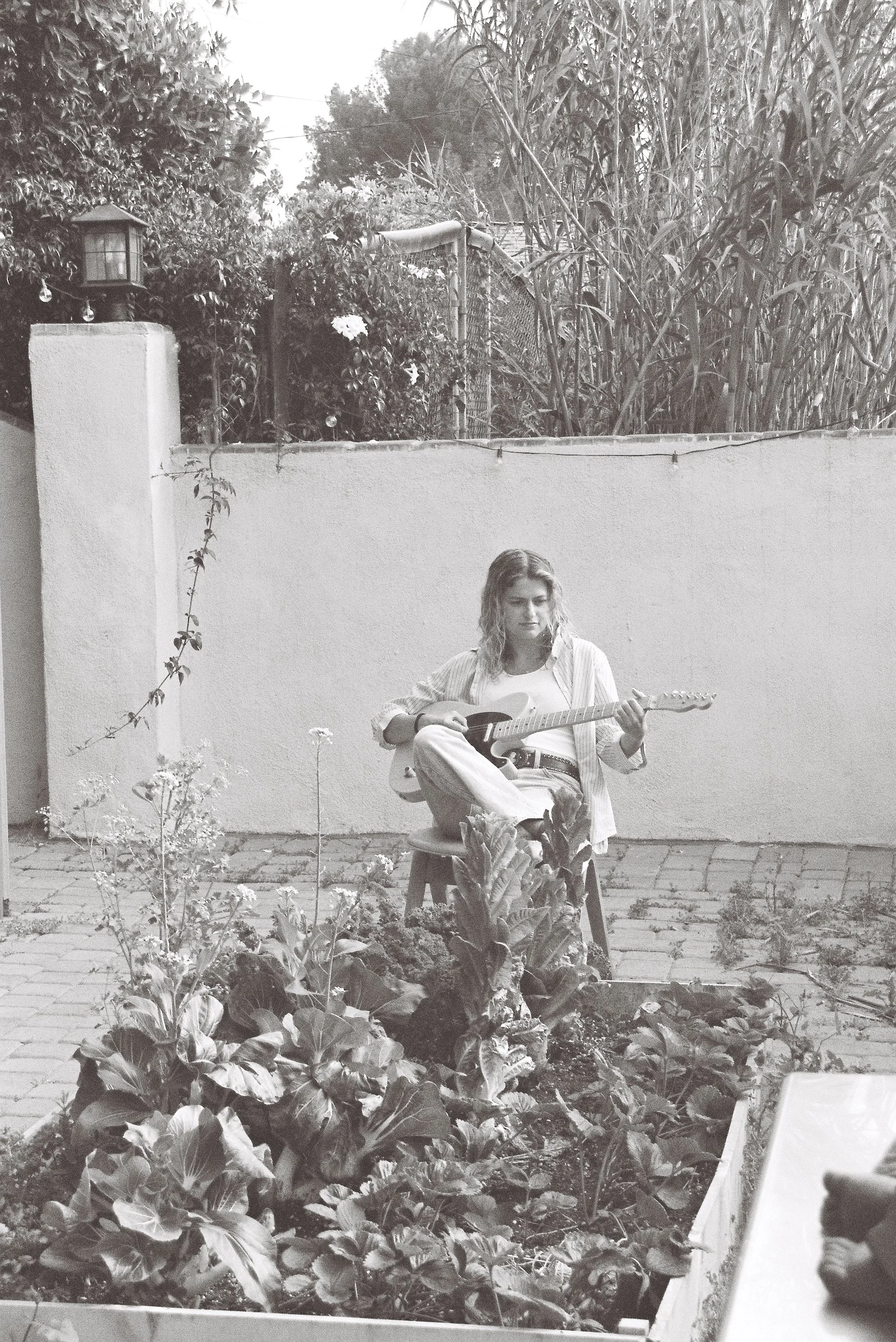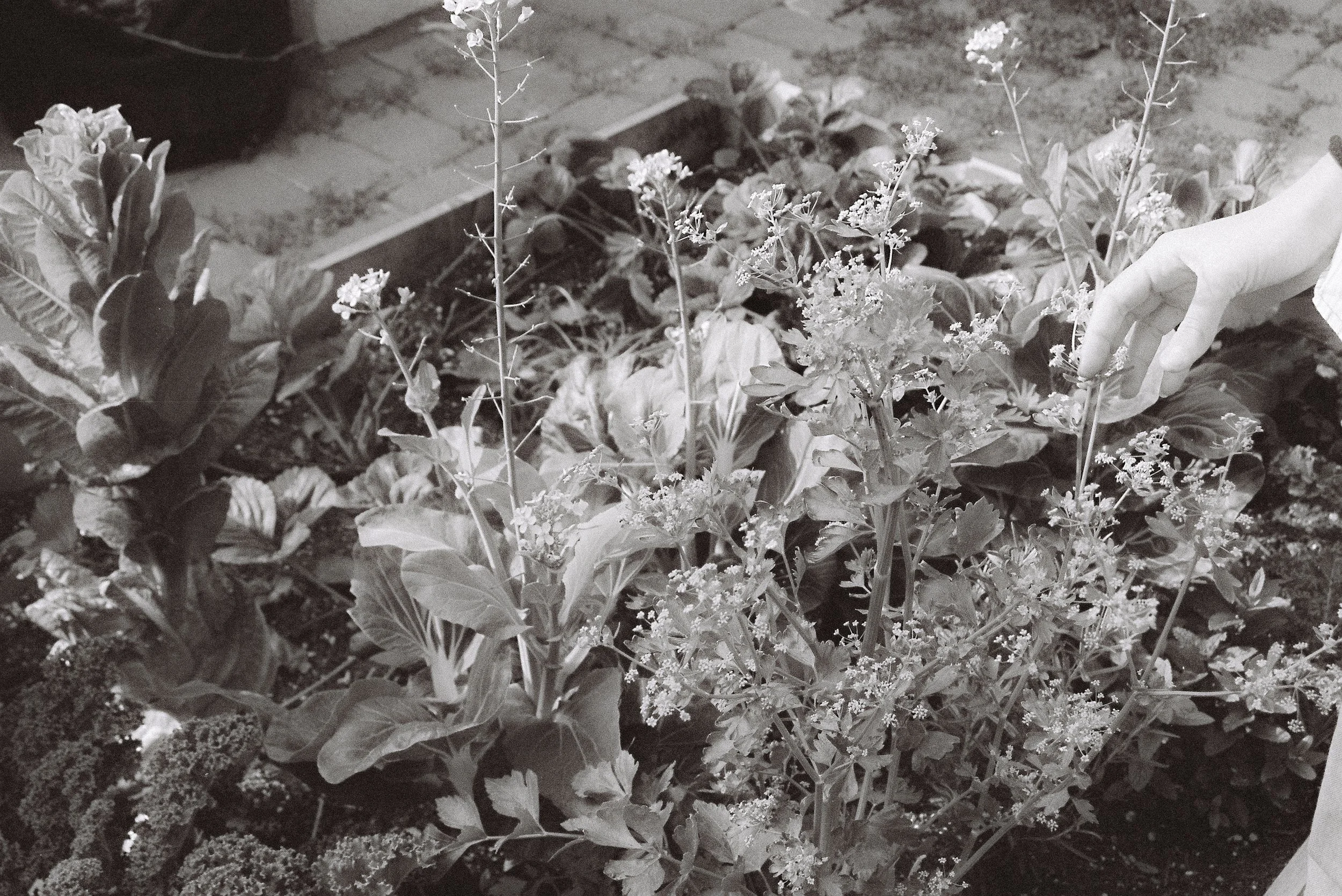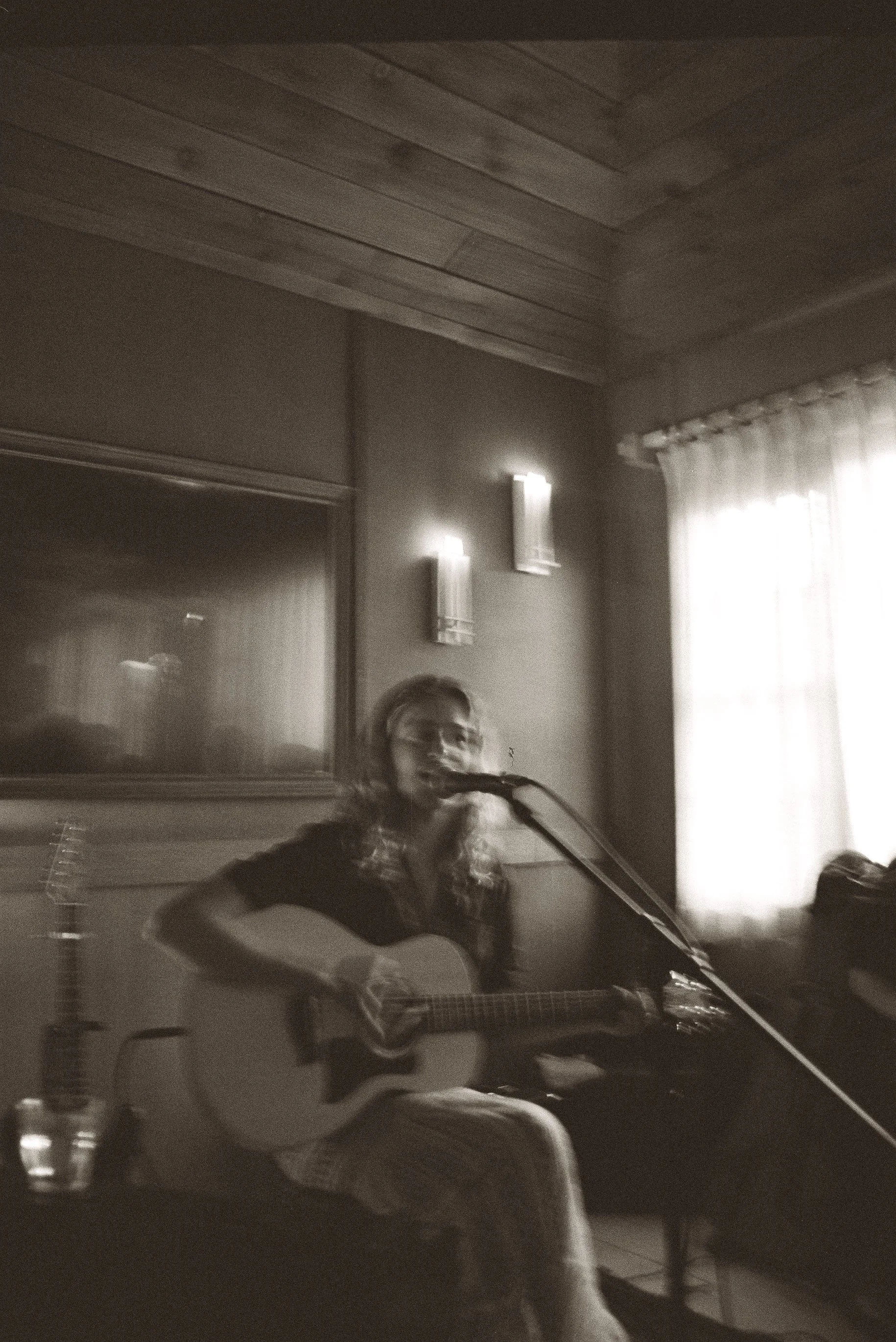ABBY WALKER
I was, simply, minding my own business, locked acutely into my computer screen. I remained tucked away, blending into a shaded corner of a Silverlake café, writing. In a fleeting moment of rumination, I looked up from my laptop, desperately searching for the words within the faces of the café-goers. My eyes stumbled upon a young girl, basking in sunlight, looking, too, for words around her.
She met my gaze, and something propelled me to ask,
“What are you writing?”
This is how I met Abby Walker.
She giggled softly and raised her hand above her eyebrows, shielding her eyes from the sun. She responded kindly with, “A song.”
Very quickly, we became friends.
I was moved by how open she was. How honest she was about her artistic journey, sharing tales of moving to Los Angeles, her folky musical influences, her path to building community, her artistic process.
I knew we had to sit down for an interview. That day, we made plans to do so.
A week or so after we met, as I prepped for our conversation, I snuck into one of Abby’s gigs. In a room of thirty people, Abby commanded the room. Her hauntingly beautiful voice reverberated off the oak walls; emotion seeped through every note she sang; her guitar was an extension of her body; her vintage piano carried her ballads.
Her voice held a divinity. It was so warm, so honest, so unapologetic.
As we now sit in a pocket of tall trees and grass for our interview, a few steps away from her Echo Park flat, I learn, more personally, of her soul. She is the type of reflective artist who is always shedding and mutating, perpetually experiencing the death of the ego in her search for authenticity and community, her evolving openness in her writing.
I realize that the divinity we hear in her sound isn’t necessarily a force from beyond, but rather, a force from within. After years of growing pains, she has discovered a deep connection to and understanding of herself, and that quality in her sound, in all of its glory, is transcendent.
In understanding her soul, maybe you can understand yours too.
WELCOME TO EGO DEATH.
The Abby that I met, that day at the café, a beacon and proprietor of light, is the same Abby that walked the suburban streets of San Francisco as a child.
She was always known as the “bright light” to her family, her friends, and her community. She was giving and kind, constantly bending backwards for others. She held so much love for her home, but didn’t always feel like her external image reflected her internal feelings.
“I felt like my role was to be that [light]. I was so impacted by the ‘audience’ my whole life, trying to please people.”
Abby grew up in an environment that was supportive, yet non-artistic. While she notes that art was around her, she wasn’t necessarily “receptive” to it or encouraged to embrace it professionally. She studied hard, received the best marks in school, and eventually landed at one of the best universities in the world…but, in doing so, felt that she was ignoring the angel on her shoulder that was calling her to a different path.
Ultimately, what Abby now reflects upon, is that she didn’t feel she had a consistent outlet for her emotional life.
“My parents got divorced when I was young. My parents had a really unhappy marriage, and my mom was depressed for a while. I was holding on. I didn't feel emotionally safe. I was in these schools that were very cliquey, and I think at the time, what felt safe was ‘being cool’ or ‘having friends,’ ‘focusing on school,’ and latching onto external things.
A lot was suppressed in me. There was a lot of noise, a lot of forces that didn't feel great, honestly. San Francisco had an awesome music scene, but it wasn’t easy for me to find an artistic community often that felt nurturing.”
This led Abby to cling onto what was in her control and what was expected of her. However, she knew, deep down, what she wanted to choose for herself...music.
She laughs as she notes, “Music found me. The obvious answer for how it started was that I took piano lessons starting at 5 or 6 years old. While that was awesome, it’s funny being a kid when parents can kind of choose hobbies for us. I’m grateful I had parents that did. But I also think music’s real magic began for me when I started to choose it for myself — when it came to me naturally.
There was a summer in the sixth grade where I was living with my grandma. My parents had wanted me to go to a camp and I didn’t want to go. It was overwhelming for me, socially, and I always got homesick but was embarrassed to admit it. My dad said, if you don't go to camp, then learn something. So, I picked up a guitar.”
That summer proved to be a significant turning point for Abby. While she had previously dabbled with songwriting in her early piano years, something changed when she picked up the guitar.
She continued to befriend her artistry, and by that time the next year, she was presented with an opportunity that would unexpectedly change her life.
At thirteen, a Canter at her synagogue, Marsha, encouraged her to perform at her own bat mitzvah. Marsha had noticed Abby’s proclivity to music. Abby had always been moved by Marsha’s folk-take on the more traditional Hebrew songs.
“I needed someone like her, who I looked up to, to say, you should sing, Abby. I sang Joni Mitchell's ‘Circle Game’ at my bat mitzvah, and I remember feeling big and powerful and spiritual, singing that as a 13-year-old.”
This was the angel on her shoulder.
While this event may have affirmed her inner knowing - that music was her path - she couldn’t quite shake the external forces that commanded her life. She continued writing and practicing, but she exerted most of her energy towards getting into a good college…and that’s what she achieved.
She spent four years at Yale. She often recalls the joyful moments of her time there: her friendships. But ultimately, she was fighting for air. “It was a school where I felt the need to maximize and do everything.”
Emotionally, it wasn’t much different from her upbringing, where she continuously felt the need to cling onto the external, and follow the path that everyone else wanted her to follow.
At this point, however, having spent so many years using perfectionism as an emotional outlet, she felt that she grew even further away from herself. With that, she admits to making decisions that reflected this sense of feeling lost. She entered relationships that didn’t serve her, continuously giving too much of herself. She felt this underlying competition with herself and others because she felt so far away. She didn’t even feel like she could freely create.
The truth, however, always prevails. One thing she really couldn’t shake was that angel.
Music remained a constant for Abby, even through her college years. She majored in American Studies, with a concentration in folk music. Her thesis was on American Murder Ballads. She engaged with the music scene.
What really kickstarted her journey, however, in becoming the artist she is now, was her move.
After she graduated, she packed up and journeyed to Los Angeles – originally for a job in the music industry. However, she quickly realized that the job was not for her, as she longed to be on the creative side of the music world.
She quit after two months, around the same time that her close family friend, Jobie, passed away.
This transitional time of uprooting her life, leaving her job, and losing a friend, although scary and emotional, truly did the most shaping.
She was asked to perform at Jobie’s funeral.
“Her dying that summer was rattling….and so was that performance. It taught me that what I’m meant to do is communicate something [artistically] in hopes of reaching someone. That was the angel on my shoulder. And whether it was her spirit or that experience, those are the things throughout my life that have forced me towards the light. I got here because of those angels.”
This experience was the ultimate confirmation of her purpose. She was once again, the thirteen-year-old girl at her synagogue, singing in efforts to connect with others, to connect with herself, to connect with something greater. Although Abby isn’t necessarily religious, her music is her temple. It is sacred.
With these angels in mind, she moved to Echo Park, found a flexible job, and began working on her music full time. And with that, she “started to meet people and energies that reflected [her].”
This was what she always longed for – to be surrounded by art, to be inspired, to be encouraged.
“An openness emerged. I woke up one day and thought, this is my breath and my choices are mine, and I was feeling joy, I was feeling real love. Real love from friends and people around me. That's sometimes all it takes.”
At this point in the interview, the sun is nearly setting over our green sanctuary, and Abby shares, “I feel, at this point, where I am right now, I’m 25 and I’m shedding. Shedding in a lot of ways. Little Abby was trying so hard…and inauthentic. And that’s okay.”
The act of self-reflection isn’t a stranger to Abby. In fact, on the basis of both art and humanity, its vital to her survival. She is constantly assessing who she is and who she’s meant to be, and it presents itself, most vibrantly, in her songwriting.
“Adrianne Lenker has a lyric in her song “Steamboat,” where she sings, ‘I can’t put a lie in the mouth of a song.’ I’m tapping into such deeper truths as I get older and I’m more honest with how I’m actually feeling.”
Since moving to Los Angeles, Abby has released six songs, all of which cover themes of love, loss, home, and the journey of self-discovery.
Her songs are deeply honest and spiritual, not in the conventional sense, but in the way that they are directly from the heart, lyrically and melodically. She finds a way to make her feelings relatable, while using metaphors of nature and God, with the latter she notes, “I’m still figuring out what that means.”
It wasn’t until she wrote “Lonely but Closer,” her most recent release, however, did she feel that she reached the deeper truth she was longing to tap into.
“A lot of what I struggled with growing up was fear of abandonment. A fear of feeling like if I’m fully me, Abby, will people still be there? Or will I feel that I’m enough? For a while, I didn't give myself a lot of space to figure out who that person was…but she's always been there. In writing ‘Lonely But Closer,’ I was able to look at that fear.”
Lately, I long to be invisible
Like a sparkle on the water
Infinite
But no one tries to hold it
‘Cause the sun won’t let ya
Lately the mind chatter has been much meaner
It’s flaring up my skin
There’s a little girl in a pink hat who’s trapped inside
And it makes me itch
…Dreams of avoidant past lovers
I sweat under my covers
And wake up Lonely
But Closer
To the girl by the river
…The more she sees the light
The less she tries to hide
The more I feel alive
I wanna feel alive
(Excerpts from “Lonely but Closer”)
This song directly illustrates exactly who Abby is, reflective and beautifully sensitive, and what she’s ultimately found, a sense of freedom within being on her own, holding accountability for herself. In pulling away from the external pressures that she’s latched onto - moving to Los Angeles, leaving toxic relationships, committing to music - she has found the “light.” She has connected back to the little girl playing guitar at her grandma’s house or singing at her synagogue. And that feeling, above all, is a call to action – as she longs to feel “alive.”
“Songwriting itself doesn't feel like an escape. Everything, for me, is in the performance. The song is constantly being written as I'm performing it. The entire act, the writing, the performing, it's all creating the song... Performing is my act of crazy.”
Abby’s process is perpetual. Her true sense of joy and fulfillment comes from the act of performance, breathing life into her songs. Her authenticity lies within this process, as she’s always performing from a place of truth, rewriting the song each time she sings it.
At this point in her artistic development, this is extremely important for her. Her songs are very dear to her, and she notes that sometimes, once a song is released, “it doesn’t feel like [hers] anymore.” While this is a beautiful thing for her sometimes, as it lives on with its listeners, performing is a way to reclaim her art, a way to embody the creations that she holds so close.
She has also learned, overtime, to perform for herself, and less for an audience. For so long, she felt the need to sing what the audience wanted to hear, whether that meant playing old songs that she didn’t necessarily feel inclined to sing or covers that would just please a crowd. As she has learned to prioritize her feelings and needs in her own life, she has learned to make the art of performing, her truest love, the utmost extension of herself.
Abby is currently working on her first cohesive project, an EP called “The Butter.” Although it’s still in its churning stages, I had the honor of listening to a few of her songs at her most recent performance.
While she was initially afraid to play it, she decided, “I love it, so I must…of course I'll play it. I feel like I'm letting go of attachment. I feel much more detached in a way that is really freeing. I am letting go of the ego and want to bring that to my shows, and to my life. I want to embody it. Everything I am, everything I wear. That feeling is so fun.”
This upcoming release is so extremely true to her in its composition, its themes, and its spirit. It is deeply symbolic of her own shedding of the ego, as it is authentic to her. Through and through.
The world will be lucky to hear it, and it will live on, through the souls of its listeners, and through the rewriting in her performances.
As we pick up our belongings and move towards her apartment, I ask, “when you envision yourself in the future, in your truest most artistic form, what do you see?”
She responds, “I say I'm a performing artist. It's everything I do, everyone I meet - it’s the way I want to live, the way I want to interact with the world. I see orange and blue. I see the little girl in the pink hat. I see some vulgarity. Messy hair. Chicken. Sweet chicken. I love chicken. Like hot chicken. Guitar and banging my head. A hammock. True love, which I’m really enjoying right now.”
Once we enter her space, I see it all. A group of friends wait at her apartment, chatting, laughing, grilling (chicken). She introduces me to each individual member of her community, and I see Abby in all of them. I see the collective kindness, passion, and artistic drive. I see that she has finally found the people and place that reflect the artist she has been wanting to embrace within herself. All of the angels.
I marvel at the light that she is – in both her art and her friendship.
The light that she has found for herself, not the light she has been told to embody. It’s warm and it’s authentic. It’s soulful, its honest, its beautifully raw.
She smiles and shares, “once you start living your truth and creating your art, it's like there's no going back.”
EGO DEATH
Story // Taylor Thompson
Photos // Taylor Thompson
CONNECT WITH ABBY
